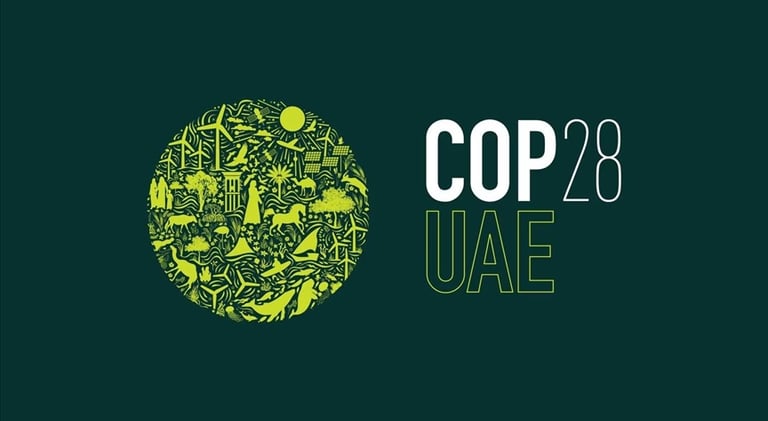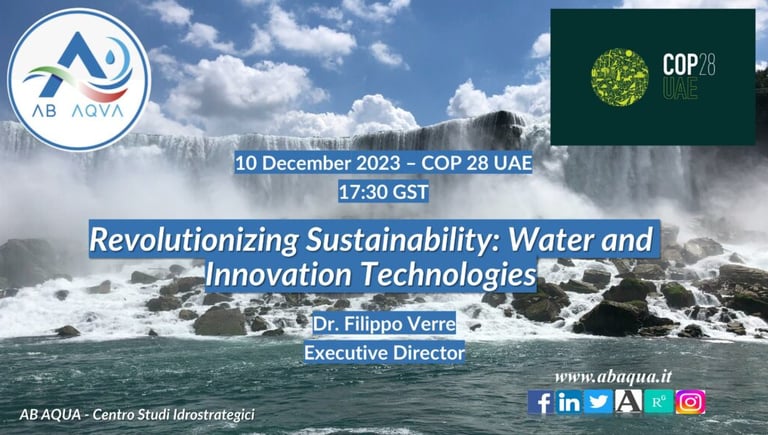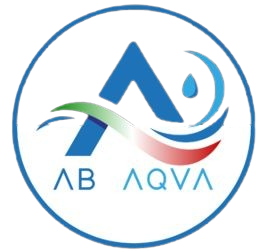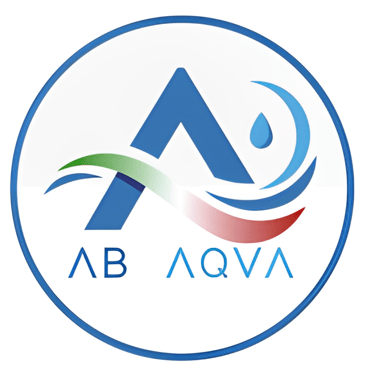International Panel at COP28 in Dubai
Filippo Verre - December 12, 2023


On 12 December 2023, Dr. Verre, President at AB AQUA, participated in an international panel held within the framework of COP28 in Dubai. The topic discussed was the interaction between water crises and technological innovations.
Water, conceived as a strategic resource, will shape the future of the next generations like never before. Fresh water reserves are slowly running out. Pollution is endangering essential water sources for millions of people, climate change is raising sea levels and altering borders with worrying effects for millions of people, and explosive population growth in some areas of the planet is putting natural resources (including water) to the test.
As a result, today water is rapidly assuming a central role in international relations. In essence, it is no longer “just” a natural element essential for human life; water has taken on a decisive strategic value. It is the so-called “blue gold” that, like other precious commodities such as diamonds, oil and gold, plays a key role in shaping international politics. Hydro-Strategy and its ramifications at the political, economic and financial levels will be extremely relevant in the coming years. The study of this subject requires a multi-scale analysis, which employs different academic and scientific disciplines: economics, finance, sociology, international law, geopolitics, civil engineering, public health.
The title of the speech given by Dr. Filippo Verre was: “Revolutionizing Sustainability: Water and Innovation Technologies”.


Among the various strategies proposed, Dr. Verre highlighted three relevant aspects during the panel we attended at the COP28 Conference:
1) The use of Artificial Intelligence (AI);
2) The use of high-tech drones to search for water in the subsoil;
3) The exploitation of the Condensation Principle to produce clean water through air humidity;
1. Artificial intelligence. Artificial intelligence algorithms can analyze large amounts of data to improve the use of water resources. AI helps identify potential problems such as pollution or leaks in water systems. AI can also predict water demand more accurately, promoting better allocation and distribution of resources. Intelligent water management systems can have a significant impact in terms of innovation. Thanks to the integration of sensors, data analysis and the Internet of Things (IoT), these systems can monitor water quality in real time, detect leaks and optimize distribution networks. This not only helps conserve water, but also minimizes waste, making water infrastructure more resilient and sustainable. AB AQUA has recently worked on projects focused on implementing artificial intelligence to make urban water networks more efficient and safe.
2. Drones with electromagnetic capability. Modern technology allows drones to be used to probe the subsoil in search of water resources. Using electromagnetic equipment mounted on high-tech drones, it is possible to search for water without large-scale drilling. This mechanism has many advantages, both from an economic and environmental point of view. First of all, the costs of this procedure are much lower, since drills are not used, which are notoriously very expensive. Furthermore, by not digging large holes in the subsoil, this solution is much more sustainable from an ecological point of view. This water search technique could be encouraged to probe more square meters of land at a reduced economic and environmental cost.
3. The principle of “induced” condensation. The possibility of generating humidity from the air is being studied by various academic institutions and research centers, with the aim of allowing the populations of arid regions to have access to the so-called "blue gold", without having to spend many days searching for distant water sources for the daily supply of this essential natural substance. In this regard, Dr. Verre shed light on the process of extracting water from the atmosphere, stressing on how it is of extreme interest, especially from an engineering and economic standpoint. Currently, there are various techniques that could be studied and proposed to literally "produce" water from the air through an industrial process.
Through technology applied to hydro-strategy, water could become a tool for cooperation and friendship that would promote integration between the northern and southern shores of the Mediterranean. By structuring a network of projects, climate migration could be progressively reduced, which every year causes the forced displacement of tens of thousands of people who do not have the water resources necessary to lead a normal life. This approach would be in line with Goal 17: Partnership for the Goals of the SDGs, which aims to “strengthen the means of implementation and revitalize the global partnership for sustainable development”. Similarly, other SDG goals would be implemented, such as Goal 6: Clean Water and Sanitation and Goal 5: Gender Equality. The implementation of high-tech projects could promote the presence of clean water in many areas characterized by water scarcity. In addition, the presence of more water in some rural locations could favor the schooling of women. In this regard, young women who used to go to fetch water from wells located many kilometers away from their homes could go back to school, focus on obtaining a better education, work, etc.
At this link it is possible to see the slides that were presented during the panel: https://drive.google.com/file/d/1GhoSSqQxNJhOLfrd7pQXAZxSjWnRx3bV/view?usp=sharing.
Abaqua
Via Cassia, 615
00189 Roma (RM)
© 2024. All rights reserved.
Codice Fiscale: 96584590580


